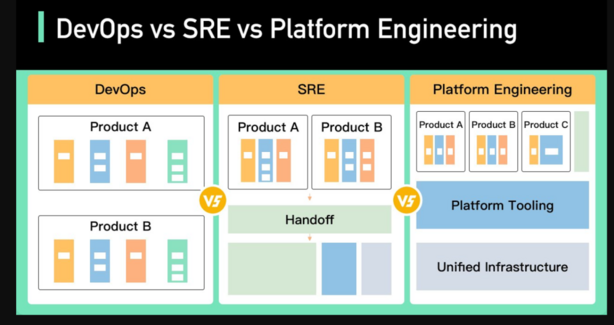𝗗𝗲𝘃𝗢𝗽𝘀 𝗩𝘀 𝗦𝗥𝗘 𝗩𝘀 𝗣𝗹𝗮𝘁𝗳𝗼𝗿𝗺 𝗘𝗻𝗴𝗶𝗻𝗲𝗲𝗿𝗶𝗻𝗴
Limited Time Offer!
For Less Than the Cost of a Starbucks Coffee, Access All DevOpsSchool Videos on YouTube Unlimitedly.
Master DevOps, SRE, DevSecOps Skills!

Here’s a comparison between Development Operations (DevOps), Site Reliability Engineering (SRE), and Platform Engineering in tabular format:
| Aspect | DevOps | Site Reliability Engineering (SRE) | Platform Engineering |
|---|---|---|---|
| Focus | Collaboration between development and IT operations for efficient software delivery and deployment. | Ensuring reliable and scalable software systems by applying engineering principles to operations. | Building and maintaining platforms that empower development teams to create, deploy, and manage applications. |
| Roles and Responsibilities | Shared responsibilities across development and operations teams. | Emphasis on specialized engineering roles for site reliability. | Focus on creating and maintaining the underlying platform for application development. |
| Culture | Cultural shift towards improved collaboration, communication, and continuous improvement. | Strong engineering culture with a focus on automation, reliability, and scalability. | Collaboration with development and a focus on providing the right tools and environments. |
| Goals | Faster and more frequent software delivery, continuous integration/continuous deployment (CI/CD), improved collaboration, and automation. | Ensuring system reliability, availability, and performance through automation, monitoring, and incident response. | Building an efficient, standardized platform that supports application development and deployment. |
| Automation | Automation of deployment pipelines, configuration management, and infrastructure provisioning. | Extensive automation of operational tasks, incident response, and scaling. | Automation of platform creation, provisioning, and management to streamline application deployment. |
| Monitoring | Monitoring application performance, availability, and infrastructure health. | Extensive monitoring of systems and services to proactively detect and address issues. | Monitoring platform health, resource utilization, and availability to support application teams. |
| Incident Response | Collaboration in incident response, aiming for quick resolution and minimizing downtime. | Rigorous incident management with well-defined procedures and post-incident analysis. | Providing support for incident response within the platform context. |
| Scalability | Scalability is considered, but the primary focus may be on software delivery and collaboration. | Strong focus on designing systems that can scale to meet user demands effectively. | Scalability is important for both the platform and the applications built on it. |
| Reliability | Reliability is important, but may not be the sole focus. | Ensuring high system reliability through engineering practices and cultural principles. | Reliability is crucial for the platform itself to support application development. |
| Tooling | Uses a range of tools for CI/CD, configuration management, and deployment automation. | Utilizes tools for monitoring, incident management, and automation of operational tasks. | Develops tools that enable consistent and efficient platform provisioning and management. |
| Skills | Development, operations, and collaboration skills are emphasized. | Strong engineering skills, including software development and system design. | Skills in platform architecture, infrastructure automation, and tool development. |

It’s important to note that these roles and concepts can vary based on the organization and its specific needs. DevOps, SRE, and Platform Engineering all contribute to the goal of delivering reliable and scalable software systems, but they approach it from different angles with distinct focuses and methodologies.